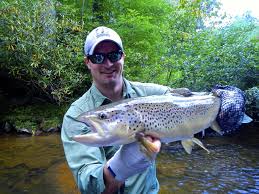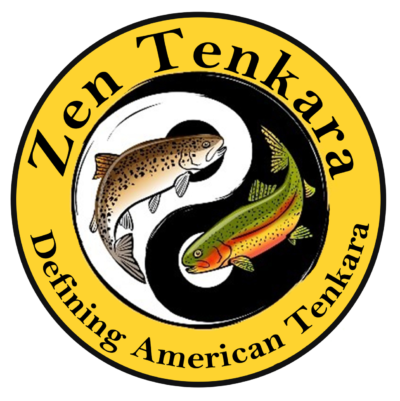
Rob, let me start by saying it’s great to have a fellow tenkara guide as a presenter! You and your partners at Tenkara Guides LLC in Salt Lake City, Utah, were among the first professional guides in North America. Tell me how you three got your start?
Tenkara Guides was founded in 2011 by three fishermen with zero interest in business. Erik, John and I met at the very first tenkara gathering in Salt Lake – an event Erik and John had organized back in 2010. John is a Utah native. He was working for a fly fishing outfit in California at the time, thinking about moving back to his home state. Erik and John met on one of the early tenkara forums, but had never met face-to-face until the day of the event. I was in the middle of a year of bumming it, living out of my Jeep, traveling around the country, following the fishing and rock climbing seasons. The three of us hit it off real well. We did a lot of fishing together that year – obsessive, gluttonous, nonstop fishing, five or six days a week, for eight to twelve hours a day. We fished as a team, hitting the same stretches with different techniques. Sometimes we fished in parallel, sometimes we leapfrogged, and sometimes we fished the same holes. But we always stayed close enough to study each other and share ideas. Thanks to that team approach, my fishing skills grew exponentially that first year, and I think the other guys would say the same. By the end, we had fished most of Utah’s public waters, and were intimately familiar with our local stuff. We had so much fun that we didn’t want it to end. We wanted to share it with other people. So we started guiding. Tenkara Guides was born out of fun, not business. The day it stops being fun is the day we shut our doors.
As a tenkara guide, have you had any clients and trips that stand out? What made the trip so special?
There’s quite a few trips that stand out. You never forget those days when the water is boiling with risers, you’re clicking with your client, and you’re on the top of your game. Of course, that doesn’t happen every day. Sometimes none of those things line up, and you end up with a day you only wish you could forget. But if I were to pick just one, I’d pick our first TROutreach trip. We started TROutreach with the goal of introducing impaired individuals to the art of fly fishing with an absolute minimum of adaptive equipment. We wanted people to walk away with adaptive skills that would allow them to enjoy a lifetime of fishing with significant independence beyond the confines of a guided trip. Our first TROutreach trip included guys and girls missing arms, missing legs, missing two, three, and even four limbs. The trip wasn’t memorable because everyone caught a ton of big fish. In fact, a couple walked away without a catch that day. It was memorable because some of those clients had been my patients. Before I was a fishing guide, I was a doctor. As a doctor, I watched them recover and adapt to the point of leaving the hospital behind. That evening, I watched them outside, standing in a river, fending off mosquitoes, struggling to follow their drift in dying light. I have never walked away from a day of guiding more excited to guide again, or with more ideas swimming in my head, than I did that day.
Tenkara Guides teamed up with Masami “Tenkara No Oni” Sakakibara to conduct the Oni Tenkara School last year. Can you tell me how this idea got started, and how the event went last year? Will you put on another Oni Tenkara School in 2016?
We’ve fished with a lot of Japanese tenkara anglers, both in the US and in Japan. But Masami Sakakibara stands out. In Masami’s fishing, we saw in practice what we were working to accomplish. We learn something from every tenkara angler we meet. But Masami truly changed the way we look at certain aspects of fixed line fishing. We wanted to share that, and it just so happened Masami wanted to fish the Mountain West. The Oni Tenkara School was the result. The school was a three day, on-the-water intensive, fishing different types of water, using different techniques, rotating between Tenkara Guides and Tenkara No Oni himself. It took a toll on us, but the positive feedback made it worth the effort. The best thing was that students walked away with both new skills and new friendships, too. We plan on doing another Oni Tenkara School in 2016. There’s been too much interest for us not to do it again. In fact, we’re looking into expanding the concept. But doing it right means doing a lot of planning and prep. Keep an eye on the Tenkara Guides’ website and Facebook. As soon as we have solid dates, we’ll post them.
You’ve fished on six continents and four oceans…can you tell me a couple of your favorite places to use fixed-line fishing, and why?
Yeah, I’m kind of pissed I haven’t made it to Antarctica yet. Maybe someday. I will share one place I think is pretty unique – the greater Okinawa island chain. No trout there. It’s mainly saltwater fishing in a tropical to subtropical environment. In the Okinawan islands, I watched an eighty-year-old woman hand line a giant grouper off a Ryukyu limestone sea cliff. I dodged banana spiders to fish for carp and strange bass-like creatures up mountain streams, and chased hammerhead shark with a massive fixed line rod. I spearfished a little, and drank sake a lot (but not at the same time). At times, it really did approach paradise. Check it out sometime.
Your presentation at the Tenkara Winter Series involves Four-Dimensional Casting. Without giving away too many juicy secrets, can you tell me a little bit about that “four-dimensional cast” is?
We all know about casting overhand, maybe sidearm, with a tenkara rod. At Tenkara Guides, we developed a style that involved waving your rod in all kinds of crazy directions. We did it to catch the fish that everybody else was passing up, in the water that nobody else was looking at fishing. Then, we realized we could use those same crazy movements to improve our fly presentation in all kinds of situations on all kinds of water. Four dimensional casting was a way to describe what were doing to each other, then to our clients, and now to other anglers. Four dimensional casting involves breaking down a casting stroke into four basic elements, or dimensions – turning complex movements into a series of simple steps that can be practiced. Dissecting a particular cast into its basic dimensions allows you learn new casting skills, or polish ones you already possess. The goal is not to learn specific casts, but instead learn a systematic approach to building casting skills, creating adaptive anglers ready to creatively combine casting skills to meet the demands of a variety of conditions. Because each day of fly fishing poses a unique set of challenges, and the master angler is the one that produces each day.



